Upcoming Event
Conference on ‘Finding the Balance between Vigilance, Warning and Action
and Lessons from Disaster Management’
RSIS Centre for Non-Traditional Security (NTS) Studies
18–19 April 2011
Singapore
The RSIS Centre for NTS Studies will be convening an International Pandemic Preparedness and Response Conference titled ‘Finding the Balance between Vigilance, Warning and Action and Lessons from Disaster Management’ in Singapore from 18 to 19 April 2011.
The objectives of the conference, among others, are: to identify the capabilities, critical gaps, challenges and constraints in past pandemic preparedness plans and ways to apply those lessons learned in future preparedness planning; identify possible gaps in overarching policy formulation and health systems and to debate the extent that those gaps could be bridged through multi-sectoral collaborative efforts; as well as identify commonalities between influenza pandemic responses and disaster response to examine how frameworks adopted for the latter may contribute to enhancing the former.
More information on the conference will follow soon.
^ To the top
Announcements
Call for Applications for NTS-Asia Research Fellowship 2011
 |
| Credit: rosipaw/Flickr. |
The Consortium of NTS-Asia through the support of the Ford Foundation invites applications for the NTS-Asia Research Fellowship. To commence in July, this three-month research fellowship programme offers successful applicants an opportunity to work on a wide range of NTS issues in Asia. Three fellowship positions are available this year and each fellowship comes with a stipend of US$8,000 (all inclusive* for the duration of the fellowship). Young scholars are encouraged to apply.
Successful candidates can choose to conduct their research at any of the 19 NTS-Asia member institutes. Member institutes are listed below:
- Asia Pacific Centre for the Responsibility to Protect (APCR2P), University of Queensland, Australia
- Bangladesh Institute of International and Strategic Studies (BIISS), Bangladesh
- Bangladesh Institute of Peace and Security Studies (BIPSS), Bangladesh
- Centre for International Security Studies (CISS), University of Sydney, Australia
- Centre for Strategic and International Studies (CSIS), Indonesia
- Centre for the Study of Developing Societies (CSDS), India
- Centre of Asian Studies (CAS), University of Hong Kong, Hong Kong
- Ilmin International Relations Institute (IIRI) Korea University, South Korea
- Institute for Human Security, Latrobe University, Australia
- Institute for Strategic and Development Studies (ISDS), The Philippines
- Institute of Asia-Pacific Studies (IAPS), Chinese Academy of Social Sciences (CASS), China
- Institute of World Economics and Politics (IWEP), Chinese Academy of Social Sciences, China
- Institute of World Economics and Politics (IWEP), Vietnam
- Refugee and Migratory Movements Research Unit (RMMRU), University of Dhaka, Bangladesh
- Regional Centre for Strategic Studies (RCSS), Sri Lanka
- RSIS Centre for Non-Traditional Security Studies, S. Rajaratnam School of International Studies (RSIS), Nanyang Technological University, Singapore
- WorldFish Center, Malaysia
- Institute for Asian Human Community Network (AHC), Waseda University, Japan
- Women in Security, Conflict Management and Peace (WISCOMP), Foundation for Universal Responsibility, India
NTS-Asia research fellows are expected to produce at least one publishable research paper – in the form of a journal article, monograph or working paper - at the end of the fellowship period. All interested applicants should submit their applications via email by Friday, 15 April 2011, with the following information:
- A research proposal of about 2,000 words which should include a statement on the aims and objectives of the project, the time frame for the project, the NTS-Asia institution of choice, and reasons why it is the most suitable institution for such research, and output.
- Information on his/her expertise in relation to the research that is to be carried out.
- Two recommendation letters, including one from the applicant’s organisation.
- A curriculum vitae and a copy of his/her highest level of education reached.
Click here to see the required format of proposals.
All interested applicants should submit proposals via email to:
Ms Cheryl Lim, Senior Programme Officer at the NTS-Asia Secretariat and the RSIS Centre for Non-Traditional Security (NTS) Studies at ischeryllim@ntu.edu.sg.
Podcasts by IHS
Podcasts of seminars organised by the Institute for Human Security (IHS), La Trobe University, are now available online. These include a seminar presentation delivered by our 2010 NTS-Asia Research Fellow, Julie Yu-Wen Chen, on 'Absence Makes the Heart Grow Fonder: A Study of the Uyghur Transnational Networks' released on 12 December 2010.
Click here to listen to the podcasts.
CISS Receives MacArthur Foundation Grant for Food Security
The Centre for International Security Studies (CISS) has received the University of Sydney’s first grant from the US-based MacArthur Foundation to set up a two-year programme examining the emerging issues around food security in Asia and the Pacific.
The ‘Food Security in Asia’ project is the first programme of its kind in Australia focusing on what many experts believe will be a major new geopolitical and human security challenge in the coming decades. It will focus on the potential of food security issues to cause political and social instability among Australia’s neighbours.
‘We are seeing food prices go up during recessionary periods, suggesting a systemic mismatch between supply and demand’, says Professor Alan Dupont of CISS.
‘With the Asia-Pacific population set to increase by 400 million in the next 20 years, we think it’s timely to take stock of the region’s food supplies, identify areas of vulnerability and develop policy recommendations aimed at minimising the impact of looming food shortages’.
Professor Dupont was also recently featured in the Australian media drawing attention to the issue of food security in an opinion piece entitled ‘Future of Food Policy Must Start at Home’.
 | | Dr Monika Barthwal-Datta |
Dr Monika Barthwal-Datta, a non-traditional security (NTS) specialist, has been recruited to lead the project as a post-doctoral fellow. Monika is about to attend a Global Futures Forum workshop in Ottawa on ‘Security Dimensions of the Global Food System’. The workshop will be a great opportunity to develop a network of contacts in the field, and introduce the programme to a broad range of interested parties.
The programme will also support regional seminars and dialogue in Asia and doctoral research, as well as publish peer-reviewed articles. It is supported by the MacArthur Foundation Asia Security Initiative.
For more information on the programme, please contact Gemma Connolly at gemma.connolly@sydney.edu.au or +61 2 9351 6752.
RSIS Centre for NTS Studies’ Researcher Identified as one of 50 Malay/Muslim Individuals to Influence 2011
RSIS Centre for NTS Studies Associate Research Fellow, Sofiah Jamil, was identified by Singapore’s Malay language newspaper, Berita Harian, as one of 50 Malay/Muslim individuals expected to drive the community's progress in 2011. These individuals include professionals from the public and private sectors as well as politicians, religious leaders, scientists, entrepreneurs, athletes and artists.
The article, published on 25 December 2010, noted that Sofiah is an expert on issues related to the environment and climate change and is a member of the US Institute on the Environment, a programme under the US State Department's Bureau of Educational and Cultural Affairs. It noted as well that she is expected to play a more active role in addressing issues related to the environment and climate change at the community and national level in 2011.
Click here to read the newspaper article (in Malay). |
^ To the top
Recent Events
Sub-regional Workshop on ‘Ending the Displacement Cycle:
Finding Durable Solutions through Return and Resettlement’
Regional Centre for Strategic Studies (RCSS)
28–29 January 2011
Colombo, Sri Lanka
RCSS, with the support of the Ford Foundation, organised a Sub-regional Workshop on ‘Ending the Displacement Cycle: Finding Durable Solutions through Return and Resettlement’ in Colombo, Sri Lanka, from 28 to 29 January 2011. RCSS was one of two NTS-Asia member-institutes selected to conduct sub-regional workshops on NTS issues in the region this year.
The workshop aimed to look at the policies implemented by South and Southeast Asian states pertaining to the return and resettlement of Internally Displaced Persons (IDPs) who were displaced due to internal conflicts, natural disasters and development projects. It gathered practitioners and scholars from the two regions to closely examine and compare the measures that have been taken by these states to end displacement and made recommendations on future planning and implementation. Resource persons invited to the workshop came from India, Sri Lanka, Nepal, Singapore, Indonesia and the Philippines who presented papers addressing these issues in their respective countries. The papers will be included in a post-workshop report.
Dissemination Meeting/Policy Roundtable on the Responsibility to Protect (RtoP)
RSIS Centre for Non-Traditional Security (NTS) Studies
26 January 2011
Tokyo, Japan
The RSIS Centre for NTS Studies is organising a two-part series of Dissemination Meetings/Policy Roundtables on the Responsibility to Protect (RtoP) this year. The first meeting was held in Tokyo, Japan, on 26 January 2011, in collaboration with the Japan International Cooperation Agency (JICA) Research Institute. The objective of these dissemination meetings/policy roundtables is to promote an understanding of RtoP and to assist in operationalising the concept in Asian policymaking.
Within Asia, RtoP – a result of people-centred security concepts such as the human security framework and non-traditional security – has gained traction among policymaking communities throughout Asia as a response to conflicts in the region. In particular, the East Asian region provides fertile ground to further normative shifts away from the primacy of the traditional conception of state sovereignty towards sovereignty as a responsibility to protect populations as a result of its experience with conflict and the recent developments in Asian regionalism. Against this background, the RSIS Centre for NTS Studies launched the project on ‘Operationalising the Responsibility to Protect in Asia’ to examine and track normative shifts of Asian governments and civil societies on RtoP.
To achieve this, an RtoP Study Group was convened in 2009. The issues examined by the study group included the role of major powers in East Asia in the advancement of RtoP and the potential of regional mechanisms such as the ASEAN Charter and the Blueprint of the ASEAN Political and Security Community (APSC), the ASEAN Intergovernmental Commission on Human Rights (AICHR) and the ASEAN Commission on Women and Children (ACWC) to promote RtoP.
The Dissemination Meeting/Policy Roundtable in Tokyo shared the study group's research findings on possible policy entry points for operationalising RtoP in Asia and engaged with a wider community of state as well as non-state actors, including policymakers, the diplomatic corps, academics, and international and non-governmental organisations (NGOs). The event was funded by the Australian Responsibility to Protect Fund and the John D. and Catherine T. MacArthur Foundation.
BIPSS Participates in International Conference on
‘Energy & Environmental Security’
Bangladesh Institute of Peace and Security Studies (BIPSS)
21–24 January 2011
Kathmandu, Nepal
 This conference in January, organised by Konrad-Adenauer-Stiftung (KAS), gathered experts from South Asian think tanks to address the issues of energy availability and the environmental impacts of climate change that affect the South Asian Association for Regional Cooperation (SAARC) region. BIPPS President, Major-General Muniruzzaman, delivered a presentation on ‘Energy and Environmental Security: A Cooperative Approach in South Asia’ at the event. This conference in January, organised by Konrad-Adenauer-Stiftung (KAS), gathered experts from South Asian think tanks to address the issues of energy availability and the environmental impacts of climate change that affect the South Asian Association for Regional Cooperation (SAARC) region. BIPPS President, Major-General Muniruzzaman, delivered a presentation on ‘Energy and Environmental Security: A Cooperative Approach in South Asia’ at the event.
The conference also attempted to establish a framework for a study into these issues and to lay out research questions. The results from this study will be published shortly before the next SAARC summit to help draw attention to these issues.
Second Study Group Meeting on ‘The Dynamics of Internal Conflicts in Southeast Asia’
RSIS Centre for Non-Traditional Security (NTS) Studies and
Centre for Strategic and International Studies (CSIS), Jakarta
17 January 2011
Bali, Indonesia
Within Southeast Asia, the occurrence of internal conflicts has been a persistent problem that poses a serious challenge not only to the sovereignty and territorial integrity of states but also to regional stability. With these broader implications in mind, the Study Group on the Dynamics of Internal Conflicts in Southeast Asia was convened on 17 January in Bali to investigate the circumstances that resulted in the relapse, deadlock or success in resolving internal conflicts in four case studies, namely Indonesia, the Philippines, Myanmar and Thailand.
In this second meeting, the five members of the group presented draft papers for discussion and comment. Participants included Dr Rizal Sukma of CSIS, Jakarta; Assoc. Prof. Herman Kraft of the Institute for Strategic and Development Studies (ISDS); and Assoc. Prof. Mely Caballero-Anthony of the RSIS Centre for NTS Studies.
Questions of interest included the following: Why did the peace agreements in Aceh, Moro Philippines, and Myanmar collapse and lead to a relapse? Why has the conflict in southern Thailand never achieved a peace agreement and attempts at peacemaking have continued to stagnate? Why has the Aceh conflict finally come to a close and what had sustained the peace-process thus far? Following comments from the meeting, members of the study group will finalise their papers for submission in the second half of 2011. The papers are expected to be compiled and published in an edited volume.
Workshop on ‘Civil-Military Relations: Trust Building’
Bangladesh Institute of International and Strategic Studies (BIISS)
12–13 January 2011
Dhaka, Bangladesh
BIISS organised a two-day workshop on ‘Civil-Military Relations: Trust Building’ with the support of the US-based Defense Institution Reform Initiative (DIRI) at the Dhaka Sheraton Hotel on 12–13 January 2011. Presentations covered a range of issues including the role of the armed forces in disaster management, the structure and mandate of the Bangladesh Ministry of Defence and civil-military coordination between defence institutions. Participants included government officials, representatives from academia, the media, business circles and civil society as well as other concerned professionals. The presentations were followed by lively discussions.
Click here for more information on the event.
Writers’ Workshop on
‘Resurrecting Pluralistic Jammu and Kashmir: New Wave Writing’
Women in Security, Conflict Management and Peace (WISCOMP)
7 January 2011
New Delhi, India
 | | Writers and intellectuals from Jammu and Kashmir at the Fifth WISCOMP Writers’ Workshop. |
WISCOMP ushered in the new year with a writers’ workshop held in New Delhi on 7 January 2011. ‘Resurrecting Pluralistic Jammu and Kashmir: New Wave Writing’ was fifth in a series of writers’ workshops that WISCOMP has facilitated since 2003. The workshop foregrounded questions collectively facing the two prominent communities of the state of Jammu and Kashmir – Pandits and Muslims. Taking cognisance of the fact that both these communities have experienced displacement and loss in a variety of ways, the workshop endeavoured to seek answers from contemporary Kashmiri, Hindi, Urdu, Dogri, Gojri and English intellectuals and creative writers on whether the people of the state are fast forgetting the syncretic traditions and composite culture which celebrated diversity.
During the protracted conflict, the common loss for people of the state has been the traditional Shavaite-Sufi culture, wherein both Hindus and Muslims were able to transcend religious differences and share a common history of co-existence, pluralistic ethos and interdependence. The participants deliberated on whether new literary expression has eroded and departed from the diverse, yet inclusive past to a rather exclusive discourse which has aided in constructing and concretising new religio-political identities. The workshop also provided space for discussing ways to restore the syncretic traditions that were fast disappearing.
RMMRU's ‘Skill Development Training Fair 2010’
Refugee and Migratory Movements Research Unit (RMMRU)
December 2010
Bangladesh
 | | Sharing experiences on skill development in the discussion programme of the ‘Skill Development Training Fair’ held in Chittagong on 21 December 2010. |
RMMRU organised the first ever ‘Skill Development Training Fair’ last year to mark International Migrants’ Day. The fairs were organised on 20 December (Daudkandi of Comilla), 21 December (Shitakunda of Chittagong) and 24 December (Kalihati of Tangail), three working areas of RMMRU.
The fairs aimed to promote short-term skilled migration at the grassroots level. They helped to disseminate information about advantages of skills training for prospective migrants. Government technical training centres of Comilla, Chittagong and Tangail; local- and Dhaka-based private technical training centres, such as Montage Technical Training Centre and Greenland Technical Training Centre; local branches of government and non-government banks; partner NGOs; Migrants’ Rights Protection Committees of RMMRU as well as RMMRU set up stalls with useful schemes, offers and information for the hundreds of visitors that came to the fair.
Click here for more information on the event.
CSDS' Summer School Returnees Workshop
Centre for the Study of Developing Societies (CSDS)
17–20 December 2010
New Delhi, India
Eight participants of the 4th Summer School on Quantitative Methods in Political Science Research – held at Bengaluru in May 2010 – were invited for advanced training at CSDS from 17 to 20 December 2010. The four-day workshop was conducted under the supervision of Professor Pradeep Chibber from the University of California, Berkeley. Out of 20 participants from the summer school, 18 submitted research papers using national election study data. Among these, eight were selected for discussion on their papers in greater detail and were provided with tools of analysis to produce papers of publishable material. CSDS intends to produce an annual journal carrying some of these papers submitted before the 2011 Summer School.
Click here to read the CSDS-Lokniti January newsletter.
International Conference on ‘Promoting Security Sector Reform in South Asia:
Lessons from Japanese Experience’
Bangladesh Institute of International and Strategic Studies (BIISS)
14–15 December 2010
Dhaka, Bangladesh
BIISS, with the support of the Japan Foundation, organised a two-day international conference on ‘Promoting Security Sector Reform in South Asia: Lessons from Japanese Experience’ on 14–15 December 2010. Special guests included Lieutenant Colonel Muhammad Faruk Khan, psc (Retd), Member of Parliament and Honourable Minister for Commerce, Bangladesh; and H.E. Tamotsu Shinotsuka, Ambassador of Japan to Bangladesh.
Scholars from Bangladesh, India, Japan, Nepal, Pakistan and Sri Lanka presented papers during the conference. Topics covered included: ‘Security Sector Reform: A Conceptual Analysis’, ‘Self-Defence Forces: Reform and Development’, ‘State of Security Sector Reform in South Asia: An Indian Perspective’, ‘State of Security Sector Reform in South Asia: A Pakistani Perspective’, and ‘Police Reform in Post-War Japan: Lessons for South Asia’.
Click here for more information on the event.
Seminar on ‘The Role of Civil Society Organisations in Peacebuilding Activities
in Post-War Sri Lanka’
Regional Centre for Strategic Studies (RCSS)
9 December 2010
Civil society organisations (CSOs) play an important role in peacebuilding and conflict prevention and are the strongest when they are able to work together. Since the end of the 30-year war in Sri Lanka, the country has been facing numerous challenges with post-war reconstruction, displacement of civilians, resettlement and rehabilitation of IDPs, and dealing with the psycho-social impact of the war, etc. Although numerous CSOs have been engaged in some of these activities in varying degrees, there is little networking between these civil society groups.
Against this backdrop, RCSS organised a seminar titled ‘The Role of Civil Society Organisations in Peacebuilding Activities in Post-War Sri Lanka’ on 9 December 2010. The two main objectives of the seminar were to strengthen the network of CSOs engaged in post-war activities and to discuss the various challenges and problems CSOs face when carrying out peacebuilding activities. The participants included various civil society actors who are engaged in post-war activities especially in the Northern and Eastern Provinces. The seminar covered aspects such as: analysing the space available for civil society within the evolving political situation in Sri Lanka, maximising civil society’s impact, the role of women in peacebuilding activities, specific issues pertaining to working in the Northern and Eastern Provinces, and the anticipated future trajectory.
RCSS organised this seminar in its capacity as the South Asia Regional Secretariat for the Global Partnership for the Prevention of Armed Conflict (GPPAC). GPPAC is a world-wide civil society-led network that aims to build an international consensus on peacebuilding and prevention of armed conflict. It was established in 2003 in response to a call made by former UN Secretary General Kofi Annan for an international conference of civil society organisations working in the field of conflict prevention in his 2001 report Prevention of Armed Conflict. Since holding its Global Conference in 2005, GPPAC has been working on strengthening civil society networks for peace and security by linking local, national, regional and global levels of action, and effective engagement with governments, the UN system and regional organisations.
CSDS in Conferences
Centre for the Study of Developing Societies (CSDS)
December 2010
India
Dr Akhil Ranjan Dutta, Reader in Peace and Conflict Studies, Department of Political Science, Gauhati University, presented a paper on ‘Globalisation and Human Development in North-East India: Global Framework, National Manifestations and Regional Concerns’ in the National Conference on Economic Development of Assam on 13–15 December 2010, organised by KK Handique State Open University, Guwahati. Before that, he delivered the keynote address in the University Grants Commission-sponsored National Seminar on ‘Globalisation and Its Impact on the Economy in North-East India’ at Kampur College, Nowgaon, Assam, on 9 December. He also delivered a memorial lecture on ‘Human Security in North-East India: Role of the State, Civil Society and Peoples’ Movements’ at Tinsukia College, Assam on 7 December.
Professor Rajeshwari Deshpande, Reader in the Department of Politics and Public Administration, University of Pune, participated in the 5th International Conference on Federalism at Addis Ababa, Ethiopia, on 13–16 December 2010. She presented a case study titled 'Institutional Mechanisms and Issues Related to Women's Representation in Indian Federalism'.
Workshop on
‘Competing Realities: Identity, Culture and Dialogue in Jammu and Kashmir’
Women in Security, Conflict Management and Peace (WISCOMP)
29–30 November 2010
New Delhi, India
 | | Mr G. K. Pillai, Home Secretary, Government of India, speaking at the workshop. |
A WISCOMP Consultative Workshop titled ‘Competing Realities: Identity, Culture and Dialogue in Jammu and Kashmir’ was held on 29–30 November 2010 in New Delhi. The workshop brought together over 40 academicians, former administrators, civil society actors and political actors from Jammu and Kashmir to explore how different ethnic, regional and religious identities have emerged and/or transformed in the state since the Amarnath Land Dispute, and the impact of these developments on the prospects for dialogue amongst different stakeholders. The workshop provided a platform to discuss the ‘representation’ of identities in the public space, the factors behind the discontent among the youth in the Valley, the points of convergence and divergence between the existing and new faultlines in the state, and the ways forward for civil society to impact policies and processes in view of the constraints and opportunities identified.
The consultation was attended by Mr G. K. Pillai, Home Secretary, Government of India and the Team of Interlocutors – Mr Dileep Padgaonkar, Professor M. M. Ansari and Professor Radha Kumar – appointed by the Government to facilitate the dialogue process in the strife-ridden state and to search for amicable solutions. WISCOMP will carry forward the recommendations of the participants by organising follow-up activities with youth and women groups in the state, and other stakeholders in Delhi, Jammu, Leh and Srinagar, in an effort to foreground constructive engagement, dialogue and non-violence.
Seminar on ‘Recalibrating Norms:
Europe, Asia and Non-Traditional Security Challenges’
RSIS Centre for Non-Traditional Security (NTS) Studies
29 November 2010
Singapore
The European Union (EU), conceptualising sovereignty in terms of ‘constitutional independence’, has made some progress in addressing NTS challenges. However, in the Asia-Pacific, the non-intervention norm has impeded multilateral, multi-level and multi-faceted efforts to deal with human security in the region.
In this seminar organised by the RSIS Centre for NTS Studies, Associate Professor Katja Weber argued that since states have the obligation to improve human rights, there is a need for a careful recalibration of sovereignty-related norms, in particular, those of non-intervention and unanimity which can often be found in regional institutions. This can be done by empowering various actors, especially those with a less stringent understanding of non-intervention, by providing them with the necessary tools to address regional problems that threaten human security, in particular those issues with domestic roots. The attempt to calibrate these norms draws on Professor Weber’s previous work on institution-building and the voluntary curtailment of freedom of action. Her research takes a comparative approach, focusing on the EU and the ASEAN Regional Forum (ARF) with reference to NTS issues.
Click here to read and listen to her seminar presentation.
Seminar on ‘Understanding and Preventing Mass Atrocity Crimes
outside of a Crisis Context’
RSIS Centre for Non-Traditional Security (NTS) Studies
12 November 2010
Singapore
Within the context of a broader strategy to operationalise the RtoP principle – whereby states have an obligation to protect their populations from the mass atrocity crimes of genocide, war crimes, crimes against humanity and ethnic cleansing – Mr Francis Deng, the Special Adviser to the UN Secretary-General on the Prevention of Genocide, in this seminar, aimed to raise awareness of the root causes of genocide and to plot a way forward for states to prevent its occurrence.
Due to the controversial nature of the term ‘genocide’, and because in the midst of crises, discussion is often reduced to whether a situation can actually be termed ‘genocide’, Mr Deng’s presentation focused on how to advance an agenda for the prevention of genocide outside of a crisis context.
He contended that genocide is an extreme form of identity related conflict, which is often provoked by horizontal inequalities vis-à-vis access to political power and economic and social resources. Therefore, Mr Deng advocates a structural approach to prevention, incorporating strategies such as the establishment of good governance, the promotion of respect for democratic values and broad respect for the dignity of the human person, as well as the development of legal norms and the rule of law, including effective judicial systems.
Click here to read and listen to his seminar presentation.
IWEP and IAPS Consultation and Dissemination Workshop on
‘Assessing China’s Impact on Poverty Reduction in the Greater Mekong Sub-region’
Institute of World Economics and Politics (IWEP) and Institute of Asia-Pacific Studies (IAPS)
Chinese Academy of Social Sciences (CASS)
26 August 2010
Beijing, China
Organised by IWEP and IAPS, in partnership with the Greater Mekong Sub-region Development Analysis Network (GMS-DAN) with the support of the Rockefeller Foundation, this workshop gathered 40 representatives from Yunnan Province in China, the US, Thailand, Lao PDR, Cambodia and Vietnam to share their research findings on China’s impact on poverty reduction in the Greater Mekong Sub-region. Their research focused on the aspects of trade, foreign direct investment and official development assistance and how these affected China’s impact on poverty reduction in the sub-region.
Click here to read more about the event (in Chinese).
^ To the top
Recent Publications
Routledge Handbook on the Responsibility to Protect
Asia Pacific Centre for the Responsibility to Protect (APR2P)
Tim Dunne, Forthcoming Book Chapter, 2011.
 In the 1990s, Tim Dunne – the Centre's new research director – enjoyed a productive writing partnership with Nicholas Wheeler. One of their key publications from this era was the 1998 Cambridge University Press edited collection on Human Rights in Global Politics – a work that continues to be widely used in graduate level courses on human rights. They have recently co-authored a chapter on RtoP that will be published in 2011. In their contribution to the Routledge Handbook on the Responsibility to Protect, Dunne and Wheeler revisit the key question of authorisation for armed protective intervention. In the 1990s, Tim Dunne – the Centre's new research director – enjoyed a productive writing partnership with Nicholas Wheeler. One of their key publications from this era was the 1998 Cambridge University Press edited collection on Human Rights in Global Politics – a work that continues to be widely used in graduate level courses on human rights. They have recently co-authored a chapter on RtoP that will be published in 2011. In their contribution to the Routledge Handbook on the Responsibility to Protect, Dunne and Wheeler revisit the key question of authorisation for armed protective intervention.
|
|
Peace and Security Review
 Bangladesh Institute of Peace and Security Studies (BIPSS)
Bangladesh Institute of Peace and Security Studies (BIPSS)
Journal, Vol. 3, No. 5, 2nd quarter of 2010.
The journal comprises articles that focus on nationalism both in India and abroad; the role of the Indian Muslim disapora in the expansion of Islamic religious networks in Southeast Asia; community engagement in policing; as well as an analysis on the Mumbai attacks in November 2008, the impact of these attacks on Indo-Pakistan relations and on the broader aspects of global jihad. |
|
Conference Report on ‘Food First: Ensuring Food and Nutrition for Urbanites’
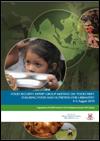 RSIS Centre for Non-Traditional Security (NTS) Studies
RSIS Centre for Non-Traditional Security (NTS) Studies
Conference Report, January 2011.
The RSIS Centre for NTS Studies convened a two-day Food Security Expert Group Meeting on ‘Food First: Ensuring Food and Nutrition for Urbanites’ in Singapore on 4–5 August 2010. This report on the meeting’s proceedings presents a range of steps that governments, businesses, institutions and other stakeholders can take to tackle the challenges of food insecurity. In particular, it highlights ways in which urban food security can be improved, examines how food security information systems can help in securing the food systems in Southeast Asia and identifies possible roles for Singapore in the global food system. |
|
Report on ‘Regional Workshop on the Protection of Civilians’
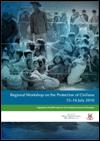 RSIS Centre for Non-Traditional Security (NTS) Studies
RSIS Centre for Non-Traditional Security (NTS) Studies
Workshop Report, January 2011.
This report comprises the proceedings of the ‘Regional Workshop on the Protection of Civilians’ organised by the RSIS Centre for NTS Studies and the International Committee for the Red Cross (ICRC) on 15–16 July 2010. The workshop aimed to understand the existing standards and frameworks, and the relevant policies; and explored ways to build on existing mechanisms to advance the protection of civilians (POC) in Asia. |
|
The Hidden Costs and Risks of Nuclear Energy: The Way Forward
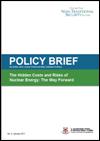 RSIS Centre for Non-Traditional Security (NTS) Studies
RSIS Centre for Non-Traditional Security (NTS) Studies
Sofiah Jamil, Jochen Prantl and Mely Caballero-Anthony, Policy Brief No. 4, January 2011.
Enthusiasm for nuclear energy has strengthened in recent years. However, while the inherent geopolitical risks of nuclear energy are well established, issues of socioeconomic feasibility and sustainability remain underexplored. At the crux of those issues is that of cost, and more significantly, the issue of hidden costs and risks which has not been given sufficient consideration by many countries. This policy brief provides an overview of the various hidden costs, and outlines recommendations for policymakers of countries which have shown interest in adopting nuclear energy. |
|
Southeast Asia and the Outcomes of the COP16
 RSIS Centre for Non-Traditional Security (NTS) Studies
RSIS Centre for Non-Traditional Security (NTS) Studies
J. Jackson Ewing and Irene A. Kuntjoro, Policy Brief No. 3, January 2011.
The United Nations Framework Convention on Climate Change (UNFCCC) concluded its annual meeting in December 2010, reaching agreements that are relevant for the climate strategies and policies of states and regions worldwide. This policy brief explores the deliberations and outcomes of this 16th Conference of the Parties (COP16) as they relate to Southeast Asian responses to climate change at the community, state and regional levels. |
|
Developing a ‘Protection of Civilians’ Agenda for Southeast Asia
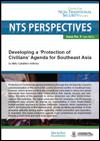 RSIS Centre for Non-Traditional Security (NTS) Studies
RSIS Centre for Non-Traditional Security (NTS) Studies
Mely Caballero-Anthony, NTS Perspectives No. 5, January 2011.
Protection of Civilians (POC) has gained prominence through the UN Security Council’s operationalisation of the norm in the context of armed conflict. In Southeast Asia, however, where armed conflicts are presently all intra-state in nature and where individuals face numerous other challenges to their dignity, security and well-being, the utility of this approach to civilian protection can often prove limited. Against this backdrop, this paper proposes that the emerging ASEAN regional framework may provide an avenue for consolidating a more broad-based, human security approach to civilian protection. |
|
The Gender and Climate Debate: More of the Same or New Pathways of Thinking and Doing?
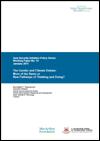 RSIS Centre for Non-Traditional Security (NTS) Studies
RSIS Centre for Non-Traditional Security (NTS) Studies
Bernadette P. Resurreccion, MacArthur Asia Security Initiative Policy Working Paper No. 10, January 2011.
Feminist and development advocates have recently taken international agreement framers to task for the paucity of gender perspectives when defining climate change agendas, a gap which has led to the emergence of ‘gender and climate change’ discourses. This paper aims to contribute to this growing concern with gender and climate change adaptation by: (i) briefly reviewing international agreements and advocacy literature in order to understand the conceptual antecedents underlying gender and climate change discourses and their respective deficits; and (ii) engaging with past and current theorisations on gender, adaptation and resilience which are relevant to a better understanding of the linkages among gender, climate change adaptation and human security. |
|
Global Norm Diffusion in East Asia: How China and Japan Implement the Responsibility to Protect
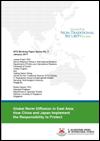 RSIS Centre for Non-Traditional Security (NTS) Studies RSIS Centre for Non-Traditional Security (NTS) Studies
Jochen Prantl and Ryoko Nakano, NTS Working Paper No. 5, January 2011.
This paper addresses the problem of global norm diffusion in international relations with particular reference to the implementation of RtoP in East Asia. Exposing the limits of previous work on norm localisation, the authors propose a norm diffusion loop framework. Rather than understanding norm diffusion as a linear top-down process, the authors demonstrate that the reception to RtoP has evolved in a far more dynamic way which can best be described as a feedback loop. |
|
Cancún Agreement: Implications for Southeast Asia
 RSIS Centre for Non-Traditional Security (NTS) Studies
RSIS Centre for Non-Traditional Security (NTS) Studies
Irene A. Kuntjoro and Mely Caballero-Anthony, NTS Alert Issue 2, January 2011.
The recent 2010 UN climate change conference in Cancún, Mexico, and the resulting Cancún Agreement, has shown that there is an increasing recognition of the need to protect the poor and vulnerable in developing countries from the impact of climate change. Looking at Southeast Asia from the perspective of it being a region which comprises developing economies, this NTS Alert explores the opportunities and challenges presented by the Cancún Agreement for the implementation of measures such as reducing emissions from deforestation and forest degradation (REDD), adaptation and transfer of technology in the region. |
|
Cancún and Climate Security: New Approaches, Mixed Results
 RSIS Centre for Non-Traditional Security (NTS) Studies
RSIS Centre for Non-Traditional Security (NTS) Studies
J. Jackson Ewing, NTS Alert Issue 1, January 2011.
As with previous annual meetings of the UNFCCC, outcomes of the recently concluded COP16 have implications for the future trajectory of climate-related security threats. This NTS Alert explores these implications by analysing the shifts in diplomatic approach which defined the COP16, and evaluating what these shifts might portend for the future of international efforts to address climate change. It investigates some of the primary reasons for participants electing to employ new tactics in 2010, reviews the outcomes of these tactics and questions the relevance of the COP16 for climate-related security threats. |
|
Year in Review 2010
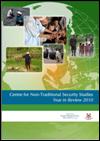 RSIS Centre for Non-Traditional Security (NTS) Studies
RSIS Centre for Non-Traditional Security (NTS) Studies
Annual Report, December 2010.
Throughout 2010, there were several notable developments which had an impact on NTS concerns. These developments informed cooperation between states and societies across the Asia-Pacific at the local, national, regional and international levels. It has been continually noted that there are numerous inter-linkages among the policy areas of internal conflict, health, climate change, energy and food covered in this Year in Review. Through this Year in Review 2010, we bring you highlights of major NTS events and issues which have taken place across the Asia-Pacific in 2010, with particular focus on Southeast Asia. |
|
The Economics of Climate Change in Southeast Asia
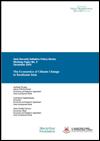 RSIS Centre for Non-Traditional Security (NTS) Studies
RSIS Centre for Non-Traditional Security (NTS) Studies
Juzhong Zhuang, Suphachol Suphachalasai and Jindra Nuella Samson, MacArthur Asia Security Initiative Policy Working Paper No. 9, December 2010.
Climate change mitigation is a global public good and requires a global solution that is built on a common but differentiated responsibility. As one of the regions highly vulnerable to climate change, Southeast Asia should play an important part in a global solution. While adaptation is the region’s priority, Southeast Asia should also make greater effort at mitigation. Adaptation and mitigation actions will create economic and business opportunities, and will provide new sources of growth. Southeast Asia should seize the opportunity now to start a transition towards a climate-resilient and low-carbon economy. |
|
H1N1 Outbreak in Pakistan: Lessons Learnt
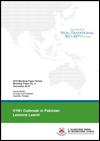 RSIS Centre for Non-Traditional Security (NTS) Studies
RSIS Centre for Non-Traditional Security (NTS) Studies
Sania Nishtar, NTS Working Paper No. 4, December 2010.
Compared to many other countries in Asia, the outbreak of pandemic influenza H1N1 appeared to be of minor concern to Pakistan. This paper analyses, using qualitative research methods, the extent to which such a notion was justified and the response of Pakistan’s health system to the outbreak, exploring the degree to which it is responsive to problems posed by an emerging infection. It looks at the health system measures introduced prior to the H1N1 outbreak (after the implementation of the International Health Regulations 2005) as these came into play during this episode, as well as specific measures introduced subsequent to the H1N1 outbreak. |
|
Nuclear Safety in Southeast Asia: Issues, Challenges, and Regional Strategy
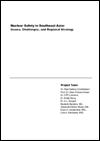 Centre for Strategic and International Studies (CSIS), Jakarta
Centre for Strategic and International Studies (CSIS), Jakarta
Rizal Sukma, Dewi Fortuna Anwar, C. P. F. Luhulima et al., Report, 1 December 2010.
This strategic policy report is the result of a research project conducted by CSIS, Jakarta. The research covers five countries in Southeast Asia, namely: Indonesia, the Philippines, Vietnam, Thailand and Myanmar. |
|
Unequal They Stand: Decision-making and Gendered Space within Family
 Centre for the Study of Developing Societies (CSDS)
Centre for the Study of Developing Societies (CSDS)
Mohd Sanjeer Alam, in Doing Gender, Doing Geography, edited by Saraswati Raju and Kuntala Lahiri-Dutt, New Delhi: Routledge, pp. 230–47, Book Chapter, 2010.
The ongoing discussion on inclusive social policy repeatedly brings equity issues for women to the fore and India is no exception. Very often naively conceptualised notions about women’s access to education and income generation are seen as translating into overall empowerment for them, including their status in the family. This is done without much attention to evidence in literature pointing otherwise to the expense of women’s contested position in the family vis-à-vis their male counterparts. |
|
Book Review of State Formation and Radical Democracy in India
 Centre for the Study of Developing Societies (CSDS)
Centre for the Study of Developing Societies (CSDS)
Ashutosh Kumar, Contemporary South Asia, Vol. 18, No. 3, Book Review, September 2010.
This book analyses one of the most important cases of developmental change in the twentieth century, namely, Kerala in southern India, and begs the question of whether insurgency among the marginalised poor can use formal representative democracy to create better life chances. Going back to pre-independence, colonial India, Manali Desai takes a long historical view of Kerala and compares it with the state of West Bengal, which like Kerala has been ruled by leftists but has not had the same degree of success in raising equal access to welfare, literacy, and basic subsistence. Ashutosh Kumar notes that Desai makes a commendable effort to historicise and concretely specify the critical role leftist parties have played in Kerala. The comparative focus on West Bengal brings out the crucial differences in the nature of the leftist-led mobilisation and rule in the two states that are reflected in their respective social regimes. |
|
Making Them Equal: The Challenge of Configuring Affirmative Action Policy for Disadvantaged Minorities
 Centre for the Study of Developing Societies (CSDS) Centre for the Study of Developing Societies (CSDS)
Mohd Sanjeer Alam, Lokniti Newsletter Commentary, January 2011.
Modern nation-states, democratic or otherwise, have come a long way to expand social, economic and political opportunities for the populace they represent. And yet, glaring social inequalities remain an inescapable fact. The weight, delicacy and intractability of the issue in democratic nations is, nonetheless, formidable, for at the core of the conception of ‘democracy’ lies sharing power and giving voices to many, especially the marginalised segments, in decision-making processes. |
|
Inequality and the Urban–rural Divide in China: Effects of Regressive Taxation
 Institute of World Economics and Politics (IWEP)
Institute of World Economics and Politics (IWEP)
Xiaobing Wang and Jenifer Piesse, China & World Economy, Vol. 18, No. 6, pp. 36–55.
Using three comparable national representative household surveys for China in 1988, 1995 and 2002, the present paper reveals the regressivity and urban bias of China's direct tax and welfare system in this period. It shows that a regressive taxation system and skewed allocation of subsidies increases the urban–rural income gap and enhances overall inequality. Modelling these relationships indicates that the relatively poorer rural population has a net tax liability, whereas those in the richer urban areas receive net subsidies. This pattern is common in China, although the extent of the bias varies. This skewed system of tax and welfare payments is a major cause of the persisting urban–rural income gap and contributes to the overall income inequality in China. The abolishment of the agriculture tax in 2006 has had a positive impact on rural people's livelihoods. |
|
HIV and Security in Papua New Guinea: National and Human Insecurity
 Michael O’Keefe, in Civic Insecurity Law, Order and HIV in Papua New Guinea, edited by Vicki Luker and Sinclair Dinnen, Canberra: ANU E-Press
Michael O’Keefe, in Civic Insecurity Law, Order and HIV in Papua New Guinea, edited by Vicki Luker and Sinclair Dinnen, Canberra: ANU E-Press
Institute for Human Security (IHS), La Trobe University
Book Chapter, 2010.
This book chapter reflects on larger strategic questions about the overall impact – social, political, economic and cultural – of the epidemic on Papua New Guinea (PNG); an already fragile state where national cohesion is very weak, and society is mainly organised at kin and local levels. Studies of the strategic effects of HIV (particularly on its possible economic impact) have not linked this to more general research on the development in PNG and various factors that threaten political and social stability. The following discussion is framed by the concept of human security and the application of this framework to the epidemic in PNG. |
|
Worldfish Report 2009/2010
WorldFish Center
 Annual Report, 2010.
Annual Report, 2010.
The WorldFish Report 2009/2010 illustrates how change is inevitable and that with dialogue and shared understanding, we can make a difference to the poor and hungry. The report shows the variety of approaches for achieving these goals, from adopting better aquaculture practices, to highlighting the nutritional benefits of eating fish, to strengthening community and ecosystem resilience and adaptive capacity. |
^ To the top
Commentaries and other News Articles
ASEAN? New Approach to Myanmar Is Nothing New
Rizal Sukma, The Jakarta Post, 20 January 2011
Future of Food Policy Must Start at Home
Alan Dupont, National Times, 10 January 2011
Policies and Solutions for Rice Production by Rural Households in Vietnam
Phan Sy Man, VER. No. 12, December 2010
COP16 Cancún: Shifting Goals of Climate Negotiations
J. Jackson Ewing and Irene A. Kuntjoro, RSIS Commentaries No. 175, 20 December 2010
Mudflow Management: Lessons for Southeast Asia
Sofiah Jamil and Devin Maeztri, RSIS Commentaries No. 170, 13 December 2010
Climate Change and Regional Defence Forces: Is There a Connection?
Evan A. Laksmana, RSIS Commentaries No. 169, 13 December 2010
Water Insecurity in Himalayas: Emerging Tensions & Lessons for ASEAN
Yang Razali Kassim, RSIS Commentaries No. 167, 8 December 2010
Nuclear Energy in Southeast Asia: Competition or Cooperation?
Alvin Chew, RSIS Commentaries No. 166, 7 December 2010
^ To the top |